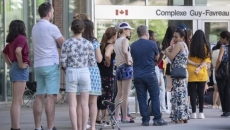OTTAWA - Prime Minister Justin Trudeau and his cabinet are in Vancouver Monday for the start of a three-day retreat as they prepare for a fall sitting of Parliament, a new Conservative leader, and the ongoing pressures of the COVID-19 recovery and inflation.
Trudeau has indicated affordability will be a key agenda item as Canadians struggle to pay their bills and inflation keeps going after bank accounts with a wrecking ball.
Last week Trudeau said Canada's economy has recovered quickly from the COVID-19 shutdowns and unemployment is at a record low — 4.9 per cent in both June and July — but there is more help to come.
"Lots of people have jobs, but there (are) still real challenges and we’re going to continue to do what is necessary to support vulnerable Canadians as we move forward, taking into account inflation, but also being careful not to do things that will accelerate or exacerbate the inflation crisis we’re facing," he said last Wednesday.
That low unemployment rate is indicative of one of the biggest challenges facing the Canadian economy right now: labour shortages.
Tim Barber, a principal at Bluesky Strategy Group, said the Liberals would do well to use this retreat to respond to the ongoing labour challenges, which are affecting everything from factory floors and restaurant kitchens, to school buses and emergency rooms.
"I would argue it is the source of so many of our pain points," Barber said.
The Liberals have been reluctant to put more money on the table to aid affordability, fearing handouts would stimulate more consumer spending and demand, exacerbating price pressures.
Trudeau and Finance Minister Chrystia Freeland have until now pointed to increases in government benefits that were scheduled to happen with or without inflation. That includes planned increases to the Canada Child Benefit, GST rebates and seniors' benefits.
Most other G7 nations moved in the spring to address soaring energy costs with direct price rebates or plans to hand out energy-related relief cheques. Some Canadian provinces followed suit — Alberta, Ontario and Newfoundland and Labrador all cut gas taxes, while Saskatchewan is promising $500 to every adult this fall.
The federal government is not moving to lower gas taxes, which would contradict their climate plan that will see gas prices slowly increase as a way to incentivize greener energy choices.
NDP Leader Jagmeet Singh pushed the government over the spring and summer to hike GST rebate and child tax benefit cheques to help those who need it the most.
Inflation has been one of the key talking points for Pierre Poilievre, the Ottawa-area MP who is widely expected to run away with the Conservative leadership this coming weekend.
Poilievre consistently blames Trudeau directly for the rising cost of basic needs from housing and home heating bills, to groceries and back-to-school supplies.
The cabinet meetings will surely include talk of how the government will respond to a Poilievre-led Conservative party.
It will also be a time to look at delivering on the agreement made with the NDP last year in exchange for that party's support on confidence matters. To live up to the agreement, the Liberals must deliver the start of a national dental care plan and a boost to housing allowances before the end of this year.
Barber said the cabinet needs to just be better at managing its files, and must "demonstrate competence."
This summer was the most normal since COVID-19 began, but emerging from two years of the pandemic brought a host of problems the Liberals did not fully anticipate. That included a debacle of passport renewals and painfully long lineups at airports as neither airlines nor government-run security and border services were staffed up for a spike in travel.
There is also a growing health-care crisis, largely created by the labour shortage but exacerbated by ongoing pressures and burnout from COVID-19.
The provinces want more federal money for health care, and Trudeau said repeatedly over the last two years he would negotiate a new health accord with the provinces once the pandemic was over. But he insists that any more money has to be met with specific deliverables, while the provinces want it without strings attached.
Trudeau insists there is no impasse and that the federal government will be there with money as soon as the provinces are ready to show results.
"Canadians need better access to family doctors, Canadians need lower wait times for surgeries, for mental health supports," he said.
"We will be there with more investments in health care but we need to be able to demonstrate to Canadians that those results are going to be tangibly delivered for them."
Ministers are also expected to have some heavy conversations about their own security amid an increase in both online and in-person threats and acts of intimidation targeting politicians.






